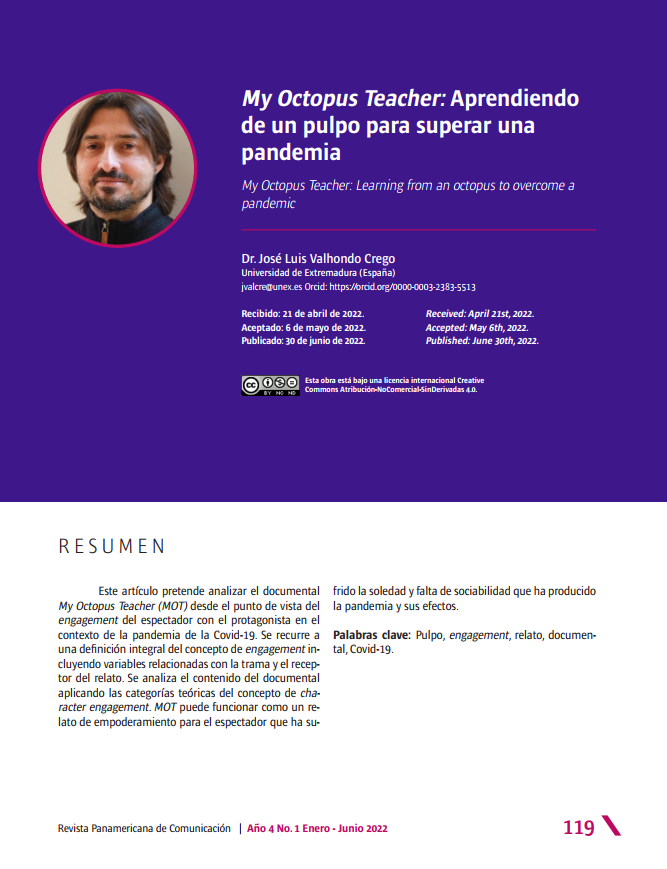My Octopus Teacher: Aprendiendo de un pulpo para superar una pandemia
Contenido principal del artículo
Resumen
Este artículo pretende analizar el documental My Octopus Teacher (MOT) desde el punto de vista del engagement del espectador con el protagonista en el contexto de la pandemia de la Covid-19. Se recurre a una definición integral del concepto de engagement incluyendo variables relacionadas con la trama y el receptor del relato. Se analiza el contenido del documental aplicando las categorías teóricas del concepto de character engagement. MOT puede funcionar como un relato de empoderamiento para el espectador que ha sufrido la soledad y falta de sociabilidad que ha producido la pandemia y sus efectos.
Detalles del artículo
Sección

Esta obra está bajo una licencia internacional Creative Commons Atribución-NoComercial-SinDerivadas 4.0.
Cómo citar
Referencias
» Balint K. y Kovács, A. (2016). Focalization, Attachment, and Film Viewers’ Responses to Film Characters: Experimental Design with Qualitative Data Collection. En CarrieLynn D. y Christopher J. (Eds.). Making Sense of Cinema. Empirical Studies in to Film Spectators and Spectatorship. New York: Bloomsbury Publishing, pp. 187-210
» Braidotti, R. (2016). Posthuman critical theory. En D. Banerji y M. R. Paranjape (Eds.) Critical posthumanism and planetary futures. pp. 13-32. India, Springer.
» Crenshaw, K. (2017). On Intersectionality: Essential Writings. Faculty Books. Consultado el 2 de mayo de 2022. En línea: https://scholarship.law.columbia.edu/books/255.
» Dancyger, K., y Rush, J. (2013). Alternative Scriptwriting: Beyond the Hollywood Formula (5th ed.). Consultado el 2 de mayo de 2022. En línea: https://doi.org/10.4324/9780240522470.
» Deleuze, G. (1986). The Time-Image. US, University of Minnesota Press.
» Fukuyama, F. (1993). The End of History and the Last Man. UK, Penguin.
» Field, S. (1994). El libro del guión: Fundamentos de la escritura de guiones (M. Heras, Trad.). Madrid, Plot Ediciones.
» Genette, G. (1972). Figures III. París, SEUIL.
» Godfrey-Smith, P. (2016). Other Minds: The Octopus, the Sea, and the Deep Origins of Consciousness. Nueva York, Farrar, Straus and Giroux.
» James, W. (1950). The Principles of Psychology, Vol. 1 (Revised ed. edition). Nueva York, Dover Publications.
» Jost, F., y Gaudreault, A. (1995). El relato cinematográfico. Barcelona, Ediciones Paidós.
» Hoffner, C., y Buchanan, M. (2005). Young Adults’ Wishful Identification With Television Characters: The Role of Perceived Similarity and Character Attributes. Media Psychology, 7(4), pp. 325-351. Consultado el 2 de mayo de 2022. En línea: https://doi.org/10.1207/S1532785XMEP0704_2
» Kross, E. (2021). Chatter: The Voice in Our Head, Why It Matters, and How to Harness It. Nueva York, Crown.
» My Octopus Teacher (2020). Dirigido por Pippa Ehrlich y James Reed. Netflix. Consultado el 25 de febrero de 2022.
» My Octopus Teacher. (s. f.). Sea Change Project. Consultado el 23 de marzo de 2022. En línea: https://seachangeproject.com/my-octopus-teacher/
» Nichols, B. (2010). Introduction to Documentary (Second edition). Bloomington, Indiana University Press.
» Ross, N. (2021). My Octopus Teacher, Posthumanism, and Posthuman Education: A Pedagogical Conceptualization. Journal of Curriculum Theorizing, 36(2), pp. 1-15.
» Sloterdijk, P. (1994). En el mismo barco/ In the same boat. España, Siruela.
» Wright, A. (2013). Monstrosity: The human monster in visual culture. I.B. Tauris. Consultado el 02/05/2022. En línea: https://westminsterresearch.westminster.ac.uk/item/8z229/monstrosity-the-human-monster-in-visual-cultur

